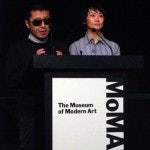Our Favorite Interviews From The Past 11 Months#
2010 has been a very interesting year for anyone working in, or keeping an eye on, China's cultural industries or luxury market, and Jing Daily has had the privilege of speaking with several experts in these arenas over the past 11 months. From mobile phone execs to filmmakers, perfumers to authors, here are some of Jing Daily's favorite interviews of 2010:

Filmmaker Jia Zhangke (Part One, Part Two)
Jing Daily:
Sixth Generation filmmakers in China such as yourself have had some impressive achievements. How about the next generation? Are they mostly working underground or within the system? How do you feel about their creative style and form — do you see any interesting aesthetic values at play? If so, are they attributable to factors like technological advancements, greater access to films from abroad, or changes in the Chinese educational system?
Jia Zhangke
: I feel that the younger generation of filmmakers, those who are younger than me, can be split into two different groups. The first is really interested in the film industry. They want to make commercial movies, work within that broad commercial channel, and really cater to the market. Whatever the market wants, that’s what they’ll shoot: comedy, satire – the kinds of films the public is really fond of. That’s good for them, but at the same time these movies are missing a sense of self. They’re just films that pander to the whims of the market.
But this is only one side of the picture. On the other side are young directors who reject the industry outright, reject the market completely. They shoot their films on shoestring budgets and don’t try to reach a broader audience. Actually, I’ve been trying to promote a new concept of filmmaking in China. If you’re that kind of director who’s interested in making commercial films, those films still need some kind of inner spirit and creativity. They still need to say something about society, about people. Quite simply, commercial films still need some sense of quality.

Perfumer Linda Pilkington of Ormonde Jayne#
As for visible trends in the demographics of shoppers on the high street in London, Pilkington said there has been a noticeable shift in the last 18 months from Russian and Middle Eastern shoppers to Asian — particularly Chinese — shoppers. When asked if the growing numbers of Chinese shoppers in Ormonde’s Bond St. boutique, or at Ormonde Jayne’s counter at Harrod’s, has had an effect on the products she’s introducing, Linda Pilkington said she is putting less focus on introducing new fragrances and more on products that highlight British craftsmanship and quality, such as cosmetic puffs, yet this is not solely the result of greater Chinese interest.
Jing Daily then asked Ms. Pilkington about her future plans, and whether she expects to take Ormonde Jayne to the China market. In terms of immediate plans, Pilkington said she plans to open six new points of sale in London in the next two years, and is then considering international locations in Russia and the Middle East by 2011-2012. She also plans to expand into the U.S. market by 2012.
In terms of the China market, Pilkinton is considering moving first into department stores or opening a specialized boutique in Hong Kong as a first step into China, but is weighing options on expanding into mainland China — with Shanghai as the most likely candidate — in the short- to medium-term.

John Wang, Chief Marketing Officer of Handset Maker HTC
Jing Daily
: Do you have a process of localization for individual markets — say for the Chinese market, the Taiwanese market, or the North American market? Do you see much difference in what these consumers demand from their phones?
John Wang
: Every HTC phone has about 300 SKUs. That’s huge. Think about how many countries there are in the world — there are only 205. So the number of variants we have is actually greater than the number of countries in the world. Now, what does this mean? It means localization goes down to the level of mobile carrier, so f0r example, in the US there isn’t just one version of phone. There are versions within different carriers and networks. The same goes for Europe, Korea, Hong Kong, Singapore, Indonesia, Australia, or China. So, that’s a long-winded way of saying, “Yes” about localization.
Ironically, when you see enough of these variations, you start to realize that the human race is actually quite similar wherever you go. Everybody wants to have their ringtone politely fade away when they pick it up. Everybody wants to flip their phone over when they’re in a meeting, whether that meeting’s in Beijing or Seattle. There are differences, however. Everybody wants to be able to connect with their friends, but in the US people use Facebook. In Asia, people use something else. In China, for example, there is a Facebook equivalent.
But you know what? That actually says commonality. Everybody wants to use social networking. The only real difference is that the popular Facebook platform in China isn’t actually Facebook. That’s all. So HTC would embody different social networking services in China versus other places.

Author Handel Jones (Part One, Part Two)
Jing Daily
: What role do you feel culture plays in China’s rise on the global stage? What kind of interest does the Chinese government, for instance, have in promoting Chinese culture overseas?
Handel Jones
: I’ve found that the Chinese are very complex and tend to operate on multiple levels. Also, deep down there’s a very strong nationalistic streak, along with a strong distrust of outsiders. On the surface they can be friendly but it takes an extensive amount of effort to gain trust. So I think the culture is very much oriented towards protecting, being cautious.
In terms of the government, I think the government is, in some ways, very anti-culture because it likes to be in control, and in my opinion the Chinese are very individualistic, very entrepreneurial. As a result, they’re very difficult to manage, even though they conform on the surface. So, in terms of exporting culture, Confucianism is often used as a tool, although how actively it’s really believed is up for debate.
I think from an external point of view, China is actually feeling its way and becoming more assertive, but I don’t think the Chinese are actually that interested in exporting culture. I think what they want is to establish themselves as being very strong and to ensure they don’t have outside influence. They’re very conscious of the past so they’re building very strong defensive barriers.

Shannon Kelley of the UCLA Film & Television Archive
Jing Daily
: Based on the films you’ve seen, how would you characterize mainstream Chinese cinema?
Shannon Kelley
: It’s much easier to read than I thought it would be, and very fun. And responsive to popular taste in a way I hadn’t expected. Because I’d been cultivated on a different kind of Chinese cinema that’s slower, more allegorical, and that called on you to do a different type of work. That art cinema seems so much more specifically Chinese than what we’re showing here. The settings in these films may be places you haven’t seen before, but the attitudes and thematic situations are much more universal. And it’s nice to think that in film terms, the audience speaks the same kind of generic vernacular that a Western audience might. That our cinemas can speak to each other with a real immediacy.
Another interesting aspect is that occasionally you see, popping into a film, a Hong Kong actor or a Hong Kong director now working in a mainland context. I don’t know how common this has been in the popular cinema, but it seems to point to some kind of cultural rapprochement between the sectors of the traditionally divided Chinese film culture—which you couldn’t even call one film culture for most of its existence. But I think it does account for some of the high action in some of these films, and the quality of humor. It’s something to keep watching.